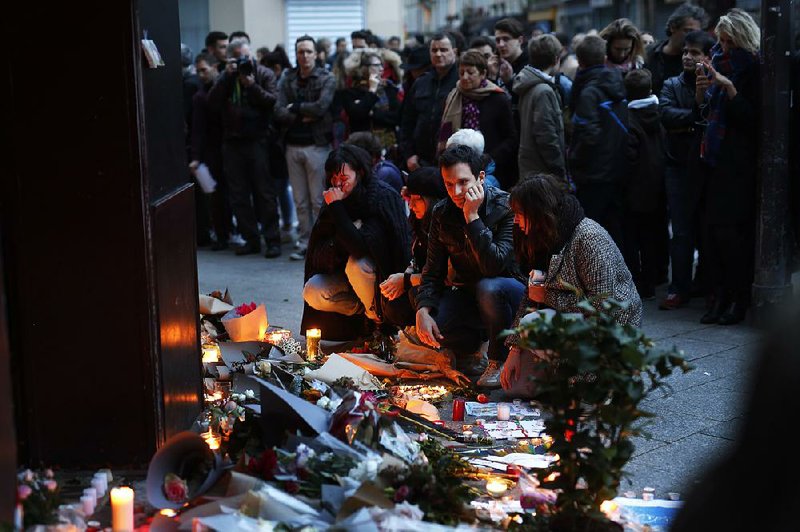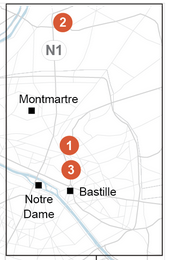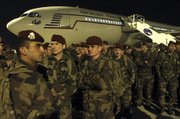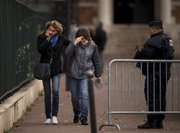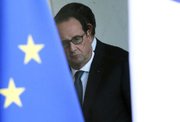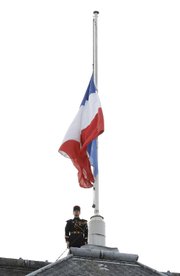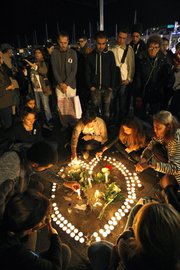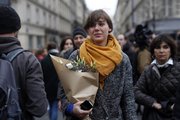PARIS -- Calling Friday's terror attacks in Paris an "act of war," French President Francois Hollande warned Saturday that his nation is considering escalating the fight against the Islamic State, which claimed responsibility for the carnage.
RELATED ARTICLES
http://www.arkansas…">Belgians, Germans investigating possible ties to attacks http://www.arkansas…">U.S., other nations extra cautious, step up security http://www.arkansas…">People gather in grief, solidarity on social media http://www.arkansas…">Band safe after theater attack
Friday night's multipronged attacks targeted seven sites around the city, including a soccer match, a rock concert and bars and restaurants. The bloody assaults killed at least 129 people, wounded hundreds more and raised the terror alert around Europe.
It was the worst attack in France since World War II and one of the deadliest terrorist strikes against a Western nation since the Sept. 11, 2001, attacks in the U.S.
Authorities initially had reported a higher number of deaths, but lowered that figure after they received more reliable counts from the various attack sites.
At least one American, a California university student studying in Paris for a semester, was among the dead. She was identified as Nohemi Gonzalez, 23, a student at California State University, Long Beach, according to a statement from the school. Gonzalez of El Monte, Calif., was in Paris studying design, the statement said.
Americans were also among the 352 listed as wounded. The U.S. State Department was working to put together a full list of Americans injured in the attacks, but no figure was available Saturday, said deputy spokesman Mark Toner.
At least 99 of the wounded -- most of them injured by a hail of bullets that struck people in the front rows of a music concert at the Bataclan theater and concert hall -- were listed in serious condition, suggesting that the death toll could rise.
Aside from the U.S. and France, the dead were from more than a dozen other countries, including the United Kingdom, Belgium, Sweden, Algeria, Portugal, Spain, Romania, Tunisia, Algeria, Mexico and Chile.
The Friday attacks reinforced worries about the Islamic State expanding its reach through recruitment and propaganda, and that its tactics are evolving to include commando-style raids.
On Saturday, police in Belgium arrested at least 10 suspects in connection with the attacks, that country's justice minister, Koen Geens, said on VRT television after a raid in Brussels.
In France, two officials familiar with the case said one of the seven attackers was a French national who was known to authorities there.
In Greece, authorities said a Syrian passport found at one of the Paris attack sites was carried by a man who passed through a migrant check point last month.
And, Pope Francis called the Paris attacks the latest scars of a "piecemeal Third World War."
Seven attackers were killed, according to reports. Six died in suicide blasts, and the seventh, also wearing explosives, was shot by police, according to a senior European intelligence official familiar with the investigation.
Paris prosecutor Francois Molins said three groups of attackers, including seven suicide bombers, carried out the "act of barbarism." He said the attackers in the Bataclan concert hall, where 89 people were killed, mentioned Syria and Iraq during their rampage.
French officials captured the fingerprints of at least four of the attackers. French, German and other European law enforcement agencies were seeking possible matches for them.
Other evidence found included the Syrian passport found at the site of the stadium attack. The name on the passport, which shows that the person was born in Idlib, Syria, was passed on to security services. It remained unclear whether the passport belonged to one of the assailants, according to two senior European security officials.
On Saturday, Greece's civil protection agency confirmed that the holder of the passport had entered Greece, most likely from Turkey, on the island of Leros on Oct. 3. A copy of the person's fingerprints was sent to French authorities to cross check against the dead assailants.
The spokesman for the Paris prosecutor's office said family members of one of the attackers -- a Frenchman born in the Paris suburbs -- had been detained. Agnes Thibault-Lecuivre declined to be more specific Saturday but said searches were underway.
Possible links to the waves of migrants crossing into Europe speak to the potential security risks as Europe struggles with the influx of people from places like war-ravaged Syria and Iraq, where the Islamic State holds territory.
Hollande suggested a stronger French response against the Islamic State. "Confronted with war, the country must make the appropriate decision," he said.
He called an emergency Cabinet meeting Saturday amid stepped-up security.
Hollande said France -- which is part of a U.S.-led coalition bombing suspected Islamic State targets in Syria and Iraq, and has troops fighting Islamic militants in Africa -- "will be merciless toward the barbarians of Islamic State group."
France declared three days of national mourning and, for security reasons, banned public gatherings through Thursday.
Timeline of events
Friday's attacks began with explosions at 9:20 p.m. Paris time at the Stade de France, the city's main sports stadium. Hollande and other dignitaries were there watching a soccer match between France and Germany.
About the same time, gunfire started 4.2 miles south of the stadium, at the Le Carillon bar, and then at a Cambodian restaurant across the street in the city's 10th Arrondissement. At 9:32 p.m., bullets flew at a pizzeria in the same district, followed by attacks on two more restaurants -- the Belle Equipe and the Brasserie Le Comptoir Voltaire, according to French BFM TV.
Then at 9:49 p.m., the 19th-century Bataclan -- one of the city's most famous music venues -- was attacked. Hundreds of people had gathered for a show by the American band Eagles of Death Metal. Four assailants opened fire inside the concert hall. Concert-goers fled into hiding and sent out panicked tweets and Facebook messages begging for police to arrive.
A 26-year-old employee at the Bataclan -- who asked that only his first name and initial, Louis H, be used -- said he was at the concert with his mother. They were sitting in the center of the hall when they heard loud sounds that he later realized were gunshots, followed by shouting and much confusion. The band stopped playing, and the lights went on.
He said he and his mother pretended to be dead, lying on the floor for 10 minutes as they heard more shots and shouts. The gunmen, he said, walked close to him, but then walked past. Later, someone shouted "they're gone," and he and his mother made a dash for the exit, passing dead bodies and wounded concert-goers as they fled.
He said he had kept his eyes diverted from the shooters. "If I looked at them, I would die," he recalled.
The Islamic State's claim of responsibility, issued on the group's internal social media site, said the venues were "precisely chosen targets in the center of the capital of France." It specifically mentioned Hollande's attendance at the soccer match.
"Let France and all nations following its path know that they will continue to be at the top of the target list of the Islamic State," it said.
In recent weeks, the Islamic State has also claimed responsibility for twin bombings in Beirut on Thursday, which killed at least 41, and the Oct. 31 crash of a Russian passenger plane in Egypt that killed all 224 aboard. Authorities, however, have not yet determined the cause for that crash.
The Islamic State's strongholds in Iraq and Syria have come under intensified attack by coalition forces of late, including Friday.
Early Friday, Kurdish fighters backed by U.S.-led warplanes cut off a main supply line for the Islamic State in northern Iraq.
Also Friday, the Pentagon said a drone strike targeted the Islamic State executioner known as "Jihadi John," who is the British-raised Mohammed Emwazi.
World reaction
The fallout of the attacks rippled across Europe and beyond.
Border checks were imposed on European frontiers that are normally wide open.
A terminal at Britain's Gatwick airport was evacuated after heightened surveillance discovered a possible firearm.
Iran's president, Hassan Rouhani, canceled a trip planned for this week to Italy, the Vatican and France, but in a message to Hollande, Rouhani called the Paris attacks "crimes against humanity," according to state television.
Iranian Foreign Minister Mohammad Javad Zarif was to accompany Rouhani to Vienna to join talks on Syria's civil war.
Zarif reportedly spoke with his Italian counterpart. Zarif said in a television appearance that the two "agreed it is now the time when the entire attention is focused on the issue of the struggle against terrorism." The trip should take place "at a more opportune time in the near future," he added.
Egyptian President Abdel Fatah al-Sissi expressed "solidarity" with France, as did German Chancellor Angela Merkel.
Saudi Arabia's foreign minister, Adel al-Jubeir, said the killings violated "all ethics, morals and religions" and called for enhanced international measures to counter the "scourge of terrorism."
The desert kingdoms' top religious body, the Council of Senior Scholars, issued a statement saying that terrorism is "not sanctioned by Islam, and these acts are contrary to values of mercy it brought to the world," the Saudi Press Agency reported.
Even as France deals with the chaos from Friday's attacks, its security chiefs are looking ahead to the task of hosting world leaders, including President Barack Obama, at a climate-change summit later this month. France insisted that there were no plans to cancel that meeting.
A city in mourning
Friday was the second time this year that the City of Light became a scene of mass murder.
In January, Islamist gunmen attacked the satirical newspaper Charlie Hebdo and a kosher supermarket, leaving a total of 17 dead.
On Saturday, Paris landmarks were deserted. The Eiffel Tower, the Louvre, Versailles and Paris Disneyland were closed for the day. So were government buildings, schools, libraries, food markets, swimming pools and gymnasiums.
Parisians expressed shock, disgust and defiance in equal measure. Hundreds of people lined up outside a hospital near the Bataclan to donate blood.
Mourners left flowers, candles and notes of sympathy beside police tape and barricades. As a shrine of flowers expanded along a sidewalk, a lone guitarist sang John Lennon's peace ballad, Imagine.
Paris resident Olivier Bas was among several hundred who gathered at the site of the Bataclan massacre Saturday, leaving flowers and lighting candles only a few hundred yards from where a police officer was murdered during the Charlie Hebdo attacks.
Although shaken by Friday's killings, Bas said Saturday that he intended to go out for a drink "to show that they won't win."
Late Saturday, up to 250 people gathered for an impromptu candlelight vigil at the Place de la Republique, the site of a demonstration after the Charlie Hebdo killings.
Adrien Chambel, a 27-year-old law student, said the crowd was much sparser than the one in January. "You feel that people are petrified," Chambel said.
Information for this article was contributed by Anthony Faiola, Souad Mekhennet, Karla Adam, Cleophee Demoustier, Virgile Demoustier, Erin Cunningham, Karen DeYoung, Brian Murphy, Hugh Naylor, Emily Badger, Steven Mufson, Kimberly Kindy, Anne Hull and Carol Morello of The Washington Post; by Greg Keller, Jamey Keaten, Raphael Satter, Thomas Adamson, Lori Hinnant, Angela Charlton, Sylvie Corbet, Jerome Pugmire, Philippe Sotto, Samuel Petrequin, John Leicester, Maamoun Youssef, John-Thor Dahlburg, Jill Lawless, Shawn Pogatchnik and staff members of The Associated Press; and by Nafeesa Syeed and Hashem Kalantari of Bloomberg News.
A Section on 11/15/2015
